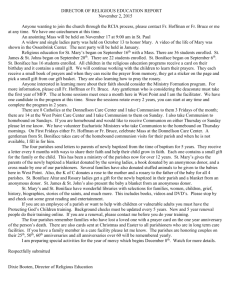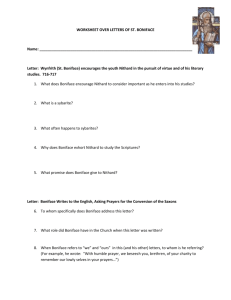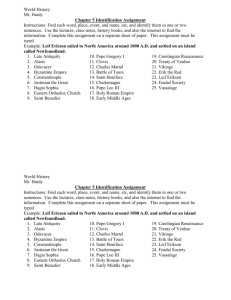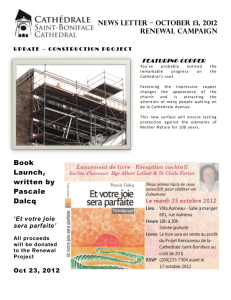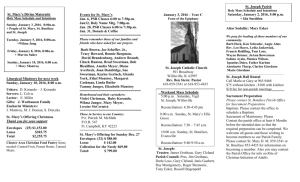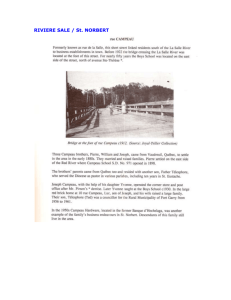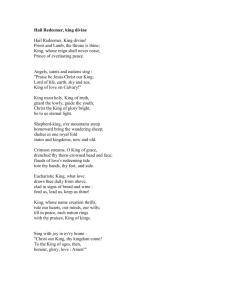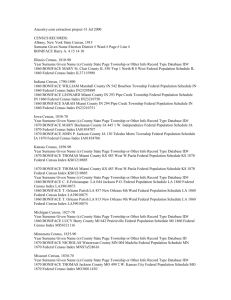Bio & Letters of St. Boniface
advertisement
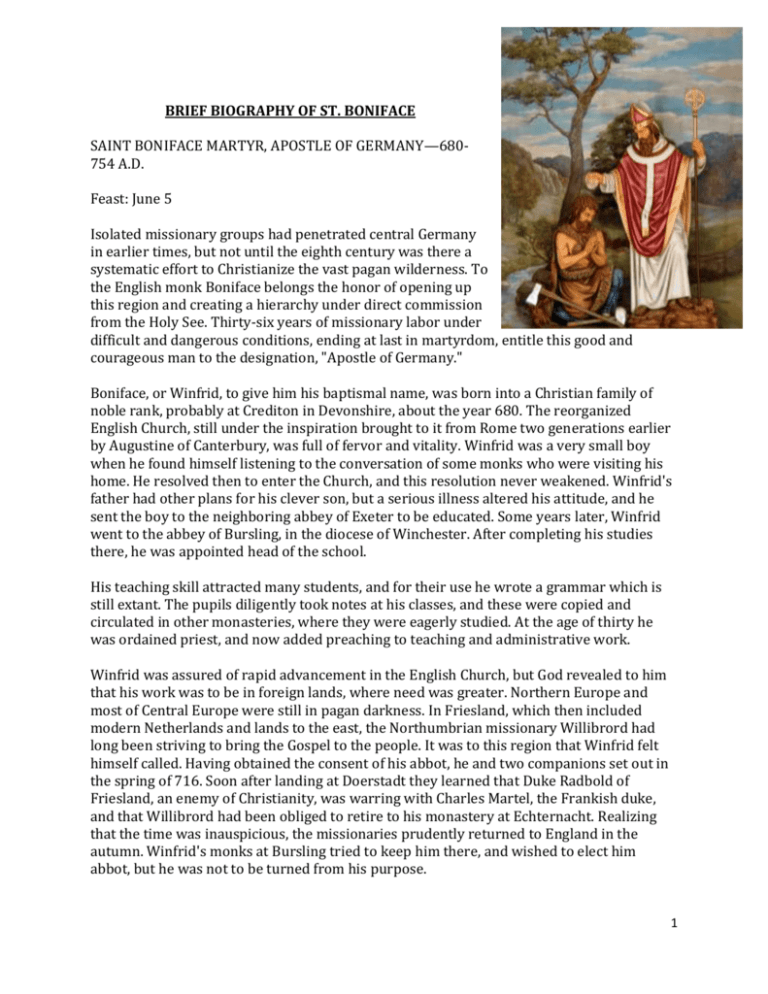
BRIEF BIOGRAPHY OF ST. BONIFACE SAINT BONIFACE MARTYR, APOSTLE OF GERMANY—680754 A.D. Feast: June 5 Isolated missionary groups had penetrated central Germany in earlier times, but not until the eighth century was there a systematic effort to Christianize the vast pagan wilderness. To the English monk Boniface belongs the honor of opening up this region and creating a hierarchy under direct commission from the Holy See. Thirty-six years of missionary labor under difficult and dangerous conditions, ending at last in martyrdom, entitle this good and courageous man to the designation, "Apostle of Germany." Boniface, or Winfrid, to give him his baptismal name, was born into a Christian family of noble rank, probably at Crediton in Devonshire, about the year 680. The reorganized English Church, still under the inspiration brought to it from Rome two generations earlier by Augustine of Canterbury, was full of fervor and vitality. Winfrid was a very small boy when he found himself listening to the conversation of some monks who were visiting his home. He resolved then to enter the Church, and this resolution never weakened. Winfrid's father had other plans for his clever son, but a serious illness altered his attitude, and he sent the boy to the neighboring abbey of Exeter to be educated. Some years later, Winfrid went to the abbey of Bursling, in the diocese of Winchester. After completing his studies there, he was appointed head of the school. His teaching skill attracted many students, and for their use he wrote a grammar which is still extant. The pupils diligently took notes at his classes, and these were copied and circulated in other monasteries, where they were eagerly studied. At the age of thirty he was ordained priest, and now added preaching to teaching and administrative work. Winfrid was assured of rapid advancement in the English Church, but God revealed to him that his work was to be in foreign lands, where need was greater. Northern Europe and most of Central Europe were still in pagan darkness. In Friesland, which then included modern Netherlands and lands to the east, the Northumbrian missionary Willibrord had long been striving to bring the Gospel to the people. It was to this region that Winfrid felt himself called. Having obtained the consent of his abbot, he and two companions set out in the spring of 716. Soon after landing at Doerstadt they learned that Duke Radbold of Friesland, an enemy of Christianity, was warring with Charles Martel, the Frankish duke, and that Willibrord had been obliged to retire to his monastery at Echternacht. Realizing that the time was inauspicious, the missionaries prudently returned to England in the autumn. Winfrid's monks at Bursling tried to keep him there, and wished to elect him abbot, but he was not to be turned from his purpose. 1 This first attempt had shown him that to be effective as a missionary he must have a direct commission from the Pope, so in 718, with commendatory letters from the bishop of Winchester, he presented himself in Rome before Gregory II. The Pope welcomed him warmly, kept him in Rome until spring of the following year, when traveling conditions were favorable, and then sent him forth with a general commission to preach the word of God to the heathen. At this time Winfrid's name was changed to Boniface (from the Latin, <bonifatus>, fortunate). Crossing the lower Alps, the missionary traveled through Bavaria into Hesse. Duke Radbold had died and his successor was more friendly. Going into Friesland, Boniface labored for three years under Willibrord, who was now very old. Boniface declined to become Willibrord's coadjutor and successor as bishop of Utrecht, saying that his commission had been general, "to the heathen," and he could not be limited to any one diocese. He now returned to work in Hesse. Boniface had little difficulty in making himself understood as a preacher, since the dialects of the various Teutonic tribes closely resembled his native Anglo-Saxon. He won the interest of two powerful local chieftains, Dettic and Deorulf, who at some previous time had been baptized. For lack of instruction they had remained little better than pagans; now they became zealous Christians and influenced many others to be baptized. They also gave Boniface a grant of land on which he later founded the monastery of Amoeneburg. Boniface was able to report such remarkable gains that the Pope summoned him back to Rome to be ordained bishop. In Rome on St. Andrew's Day, November 30, 722, Pope Gregory II consecrated him as regionary bishop with a general jurisdiction over "the races in the parts of Germany and east of the Rhine who live in error, in the shadow of death." The Pope also gave him a letter to the powerful Charles Martel, "The Hammer." When Boniface delivered it to the Frankish duke on his way back to Germany, he received the valuable gift of a sealed pledge of Frankish protection. Armed thus with authority from both the Church and the civil power, the prestige of Boniface was vastly enhanced. On his return to Hesse, he decided to try to root out the pagan superstitions which seriously affected the stability of his converts. On a day publicly announced, and in the midst of an awe-struck crowd, Boniface and one or two of his followers attacked with axes Thor's sacred oak. These German tribes, along with many other primitive peoples, were tree-worshipers. Thor, god of thunder, was one of the principal Teutonic deities, and this ancient oak, which stood on the summit of Mt. Gudenberg, was sacred to him. After a few blows, the huge tree crashed to earth, splitting into four parts. The terrified tribesmen, who had expected a punishment to fall instantly on the perpetrators of such an outrage, now saw that their god was powerless to protect even his own sanctuary. To signalize the victory, Boniface built a chapel on the spot. From that time the work of evangelization in Hesse proceeded steadily. Moving east into Thuringia, Boniface continued his crusade. He found a few undisciplined Celtic and Irish priests, who tended to be a hindrance; many of them held heretical beliefs and others lived immoral lives. Boniface restored order among them, although his chief aim was to win over the pagan tribes. At Ohrdruff, near Gotha, he established a second 2 monastery, dedicated to St. Michael, as a missionary center. Everywhere the people were ready to listen, but there was a critical lack of teachers. Boniface appealed to the English monasteries and convents, and their response was so wholehearted that for several years bands of monks, schoolmasters, and nuns came over to place themselves under his direction. The two monasteries already built were enlarged and new ones founded. Among the new English missionaries were Lullus, who was to succeed Boniface at Mainz, Eoban, who was to share his martyrdom, Burchard, and Wigbert; the nuns included Thecla, Chunitrude, and Boniface's beautiful and learned young cousin, Lioba, later to become abbess of Bischofsheim and friend of Hildegarde, Charlemagne's wife. Pope Gregory III sent Boniface the pallium in 731, appointing him archbishop and metropolitan of all Germany beyond the Rhine, with authority to found new bishoprics. A few years later Boniface made his third trip to Rome to confer about the churches he had founded, and at this time he was appointed apostolic legate. Stopping at Monte Cassino, he enlisted more missionaries. In his capacity as legate he traveled into Bavaria to organize the Church there into the four bishoprics of Regensburg, Freising, Salzburg, and Passau. From Bavaria he returned to his own field and founded new bishoprics at Erfurt for Thuringia, Buraburg for Hesse, Wurzburg for Franconia, and Eichstadt for the Nordgau. An English monk was placed at the head of each new diocese. In 741 the great Benedictine abbey at Fulda was founded in Prussia to serve as the fountainhead of German monastic culture. Its first abbot was Boniface's young Bavarian disciple, Sturm or Sturmio. In the early Middle Ages Fulda produced a host of scholars and teachers, and became known as the Monte Cassino of Germany. While the evangelization of Germany was proceeding steadily, the Church in Gaul, under the Merovingian kings, was disintegrating. High ecclesiastical offices were either kept vacant, sold to the highest bidder, or bestowed on unworthy favorites. Pluralism, the holding by one man of many offices, each of which should demand his full time, was common. The great mass of the clergy was ignorant and undisciplined. No synod or church council had been held for eighty-four years. Charles Martel had been conquering and consolidating the regions of western Europe, and now regarded himself as an ally of the papacy and the chief champion of the Church, yet he had persistently plundered it to obtain funds for his wars and did nothing to help the work of reform. His death, however, in 74I, and the accession of his sons, Carloman and Pepin the Short, provided an opportunity which Boniface quickly seized. Carloman, the elder, was very devout and held Boniface in great veneration; Boniface had no trouble in persuading him to call a synod to deal with errors and abuses in the Church in Austrasia, Alemannia, and Thuringia. The first assembly was followed by several others. Boniface presided over them all, and was able to carry through many important reforms. The vacant bishoprics and parishes were filled, discipline reestablished, and fresh vigor infused into the Frankish Church. A heretic who had been creating much disturbance, one Adalbert of Neustria, was condemned by the synod of Soissons in 744. In 747 another general council of the Frankish clergy drew up a profession of faith and fidelity which was sent to Rome and laid upon the 3 altar in the crypt of St. Peter's. After five years' labor Boniface had succeeded in restoring the Church of Gaul to its former greatness. Now Boniface desired that Britain too should share in this reform movement. At his request and that of Pope Zacharias, the archbishop of Canterbury held a council at Clovesho, in 747, which adopted many of the resolutions passed in Gaul. This was also the year when Boniface was given a metropolitan see. Cologne was at first proposed as his cathedral city, but Mainz was finally chosen. Even when Cologne and other cities became archiepiscopal sees, Mainz retained the primacy. The Pope also made Boniface primate of Germany as well as apostolic legate for both Germany and Gaul. Carloman now retired to a monastery, but his successor, Pepin, who brought all Gaul under his control, gave Boniface his support. "Without the patronage of the Frankish chiefs," Boniface wrote in a letter to England, "I cannot govern the people or exercise discipline over the clergy and monks, or check the practice of paganism." As apostolic legate, Boniface crowned Pepin at Soissons in 75I, thus giving papal sanction to the assumption of royal power by the father of Charlemagne. Boniface, beginning to feel the weight of his years, made Lullus his coadjutor. Yet even now, when he was past seventy, his missionary zeal burned ardently. He wished to spend his last years laboring among those first converts in Friesland, who, since Willibrord's death, were relapsing once more into paganism. Leaving all things in order for Lullus, who was to become his successor, he embarked with some fifty companions and sailed down the Rhine. At Utrecht the party was joined by Eoban, bishop of that diocese. They set to work reclaiming the relapsed Christians, and during the following months made fruitful contact with the hitherto untouched tribes to the northeast. Boniface arranged to hold a great confirmation service on Whitsun Eve on the plain of Dokkum, near the banks of the little river Borne. While awaiting the arrival of the converts, Boniface was quietly reading in his tent. Suddenly a band of armed pagans appeared in the center of the encampment. His companions would have tried to defend their leader, but Boniface would not allow them to do so. Even as he was telling them to trust in God and welcome the prospect of dying for Him, the Germans attacked. Boniface was one of the first to fall; his companions shared his fate. The pagans, expecting to carry away rich booty, were disgusted when they found, besides provisions, only a box of holy relics and a few books They did not bother to carry away these objects, which were later collected by the Christians who came to avenge the martyrs and rescue their remains. The body of Boniface was carried to Fulda for burial, and there it still rests. The book the bishop was reading and which he is said to have lifted above his head to save it when the blow fell is also one of Fulda's treasures. Boniface has been called the pro-consul of the papacy. His administrative and organizing genius left its mark on the German Church throughout the Middle Ages. Though Boniface was primarily a man of action, his literary remains are extensive. 4 Especially interesting and important from the point of view of Church dogma and history are his letters. Among the emblems of Boniface are an oak, an axe, a sword, a book. A FEW OF THE LETTERS WRITTEN BY ST. BONIFACE Wynfrith (St. Boniface) encourages the youth Nithard in the pursuit of virtue and of his literary studies. 716-717 To Nithard, dear companion and beloved friend, whom neither a perishable gift of worldly wealth nor the pleasing charm and blandishments of flattering words won to me, but whom the splendid affinity and kinship of the spirit recently linked with me by an imperishable chain of love, Wynfrith, a suppliant, greetings of eternal welfare in Jesus Christ. From my humble place I pray, noble youth and dear brother, that thou mayst not fail to recall the words of Solomon the wise: “In all thy works remember thy last end: and thou shalt never sin,”1 and elsewhere: “Walk while ye have the light, lest the darkness of death come upon ye,”2 because the things of the present will quickly pass, but those that abide for ever will soon be at hand. All the treasures of this world, whether in gleaming gold and silver, or in starlike gems, or in the strange 43 diversity of sumptuous food and costly garments, by a just comparison pass like shadows, disappear like smoke, vanish like foam, for the psalmist truly says: “As for man, his days are as grass: as a flower of the field, so he flourisheth,”3 and elsewhere: “My days are like a shadow that declineth: and I am withered like grass.”4 Wealth-loving sybarites are known from Holy Scripture, to keep in misery a fruitless watch,5 to spin vainly fragile spider-webs which catch a light breeze or dust, since, according to the psalmist, they heap up riches and know not for whom they gather them. And when death the agent of the hated Pluto, grinding his bloody teeth lurks at the threshold, terror-stricken and deprived of all heavenly aid they suddenly lose their precious and false wealth, which night and day they greedily and anxiously saved, and with it lose their souls. Then, caught away by fiendish hands, they enter the awful gates of Erebus to pay an eternal penalty. Since all these things are true beyond a scruple of a doubt, I implore thee with the most earnest prayers which 44 my love can suggest, that having considered their truth thou wilt hasten to revive the grace of natural ability which is in thee, and wilt not extinguish in the mire and dust of earthly desires the knowledge of the liberal arts and the bright spiritual fire of divine understanding; but that, mindful of what the psalmist says of the happy man: “But his delight is in the law of the Lord: and in His law doth he meditate day and night,”6 and elsewhere: “O how love I Thy law! it is my meditation all the day,”7 and of what is said in Deuteronomy concerning the law of Moses: “This book of the law shall not depart out of thy mouth; but thou shalt meditate therein day and night,”8 thou wilt put aside the harmful obstacles of other things, and wilt strive to pursue the study of the Holy Scriptures with all 5 the bent of thy mind, and thereby to acquire that truly noble and splendid grace which is divine wisdom. For it is more splendid than gold, brighter than silver, more resplendent than the carbuncle, clearer than crystal, richer than topaz, and on the authority of him who speaks wisdom, all precious things are not to be compared with it. What, beloved brother, can youth more properly seek or age more soberly enjoy than the knowledge of the Holy Scriptures? Guiding the ship of our soul it will bring it, without shipwreck in the 45 dangerous storm, to the beautiful shore of paradise and the eternal joy of the angels in heaven. Of it the same wise man has said: “Wisdom overcometh evil. She reacheth therefore from end to end mightily, and ordereth all things sweetly. Her have I loved and have sought her out from my youth, and have desired to take her for my spouse: and I became a lover of her beauty. She glorifieth her nobility by being versant with God: yea, the Lord of all things hath loved her. For it is she that teacheth the knowledge of God.”9 Wherefore, if the Omnipotent God wills that returning, as I purpose to do, I should reach those parts,10 I promise to be thy faithful friend to all things and in the study of the Holy Scriptures, so far as my strength allows, thy devoted assistant. Fare well, my brother, in youth’s flower and strength, Mayst flourish with the Lord in His eternal home, Where martyrs hymn the King in heavenly choirs, And prophets and apostles add their meed of praise, Where, for eternity, the King of Kings His subjects dowers, There mayst thou bear the form of cherubin and seraphin, To the apostles heir, of prophets son. 46 Nithard, avoid the dark contagion of this lowly earth, In punishment of Hell will it involve thee, The choirs above the heaven’s blue seek to discover, Hosts singing to the God of Truth eternally, Angelic canticles; there in the highest place Resplendent stand; the golden prize of Heaven’s court Draw down upon thy gleaming brows, and with thy praise Hymn Christ on His celestial throne. 6 Boniface Writes to the English, Asking Prayers for the Conversion of the Saxons To all his most reverend colleagues in the episcopate, to the venerable priests, deacons, canons, clerics, abbots and abbesses of communities, to the lowly monks who obey for Christ's sake, to the consecrated and devout virgins and all professed nuns of Christ, indeed to all those Catholics of the English race who fear God, Boniface, a native of the same race, legate of the Universal Church in Germany and servant of the Apostolic See, formerly called Wynfrith, but now, through no deserts of his own, archbishop: greetings in the humble communion and sincere love of Christ. With humble prayer, we beseech you, brethren, of your charity to remember our lowly selves in your prayers, that we may escape the cunning snares of the devil and the buffetings of evil men, that the word of the Lord may prosper and be glorified. We beg you to be instant in prayer that God and our Lord Jesus Christ, who desires all men to be saved and to come to the knowledge of the truth, may convert the hearts of the pagan Saxons to the faith, may make them repent of the devilish errors in which they are entangled and unite them to the children of Mother Church. Have pity on them, because their repeated cry is: " We are of one and the same blood and bone." Remember that we go the way of all flesh and in hell no man praises the Lord nor can death honour Him. Be it known that in this undertaking I have the agreement and support and blessing of two Pontiffs of the Roman See. Act, then, on this prayer of mine, that your reward among the angels of heaven may be manifest and enlarged. May the Almighty Creator keep your unity and common bond of love in force for evermore. Boniface Asks Protection for His Mission In Thuringia From Grifo, Mayor of The Palace Grffo was step-brother to Pippin the Short and Carloman, being the son of Charles Martel and the Bavarian Sonnichilde. When this letter was written Charles Martel had just died and the struggles between the brothers for power had not yet begun. Grifo was eventually eliminated and Pippin and Carloman gained complete control. Boniface, servant of the servants of God, greetings in Christ to Grifo, son of Charles. I beg and entreat Your Highness in the name of God the Father Almighty, of Jesus Christ, His Son, and of the Holy Ghost, by the Trinity and Unity of God, that in the event of your coming to power you will help the clerics, priests, monks, nuns and all the servants of God in Thuringia, and that you will protect the Christians from the hostility of the heathens so that they may not be destroyed by them. Thus you will reap an everlasting reward at the judgment seat of Christ. Be assured that you are constantly in our prayers to God: this, your father desired during his lifetime as did also your mother. We pray God, the Saviour of the world, to guide your steps through life, so that your soul may be saved and you may abide in the grace of God for evermore. 7 Meanwhile, my son, recall the words of the psalmist: "Man's life is like the grass, he blooms and dies like a flower in the fields." And the Apostle: "The whole world about us was in the power of evil." And Truth Himself says in the Gospel: "How is a man the better for gaining the whole world if he loses himself?. "And again in the Gospel, speaking of the glory of the just: "Then, at last, the just will shine out, clear as the sun, in their Father's kingdom." And Paul, the Apostle, said about the bliss of eternal life: "Things no eye has seen, nor ear heard, no human heart conceived, is the welcome God has prepared for those who love Him. So conduct yourself my son, that your reward may shine ever more brightly in the high vault of heaven. Our wish is that it may be well with you till the end of your days in Christ. St. Boniface the Apostle to the Germans ca. 680-755 Letter XIII, To the Holy Virgin and Dear Lady Eadburga I thank God that now I can the more fully meet thy wishes, because but lately I spoke with this brother myself, when he came back here from abroad; he set forth to me in his own words the marvellous spectacle which he beheld when rapt in spirit beyond the body… As he quitted the body, angels of such dazzling brightness that he could scarcely look upon them for their splendour, bore him up. With sweet and harmonious voices they were singing, “O Lord, rebuke me not in Thy wrath: neither chasten me in Thy hot displeasure.” “They raised me,” said he, “high into the air, and circling the world I beheld a blazing fire, the mighty flame soaring terribly aloft, as though to grasp the whole mechanism of the world in its embrace, had not the holy angel calmed it with the sign of Christ’s holy cross. When he had made the sign of the cross before the threatening flame, it gradually retired. By its terrible heat I was sorely tried, while my eyes were burned, and my sight was shattered by the brightness of the gleaming spirits until an angel, splendid to behold, touched my head with a protecting hand, and brought me safe from harm in the flames. He added that during the time while he was out of the body, such a multitude of souls leaving the body had gathered where he was as to exceed what he had thought before to be the numbers of the whole human race. An innumerable band of evil spirits and a bright choir of heavenly angles had also assembled; and there was the greatest dispute between the demons and the angels over the souls leaving the body, for the demons were accusing the dead and making heavy the burden of their sins, while the angels were excusing them and lightening their load. 8 Boniface Thanks Abbess Eadburga for Sending Him Books To his dear sister, Abbess Eadburga, long united to him by spiritual ties, Boniface, a servant of the servants of God, greetings in Christ without end. May the Eternal Rewarder of good works give joy on high among the choirs of angels to my dearest sister, who has brought light and consolation to an exile in Germany by sending him gifts of spiritual books. For no man can shed light on these gloomy lurking-places of the German people and take heed of the snares that beset his path unless he have the Word of God as a lamp to guide his feet and a light to shine on his way. Of your charity I earnestly beg you to pray for me, because as a penalty for my sins I am tossed about by the storms of this dangerous sea, begging God, who is high above us but stoops to regard the lowly, to give me words to speak my mind boldly that the Word of the Lord may run its triumphant course and the Gospel of Christ may be glorified among the heathen. To his friend in the embrace of loving arms, his brother in the bonds of spiritual brotherhood, Archbishop Egbert clothed with the garment of supreme prelacy, abundant greeting of unfailing love in Christ from Boniface, humble bishop, legate in Germany of the Roman Catholic and Apostolic Church We have received with joyful and grateful heart the gifts and books you sent us... Meantime we greatly need your advice and counsel. When I find a priest who long since fell into carnal sin and after doing penance was restored to his office by the Franks, and now dwells in a large district with no other priests and is administering baptism and celebrating Mass for a population who are believers but are prone to error- if now I withdraw him, according to the most approved canons, then, because of the scarcity of priests, infants will die without the sacred water of birth, unless I have some better man to replace him. Judge therefore between me and the erring people, whether it is better, or at least the lesser evil, that such a man should perform the service of the sacred altar or that the mass of the people should die as pagans because they have no way of securing a better minister. Or when in the multitude of priests, I find one who has fallen into that same sin and with penitence has been reinstated in his former rank, so that the whole body of priests and people have confidence in his good character, if I should now degrade him, his secret sin would be revealed, the mass of the people would be shocked, many souls would be lost through the scandal and there would be great hatred of priests and distrust of the ministers of the Church, so that all would be despised as faithless and unbelieving. Therefore we have boldly ventured to bear with this man and allow him to remain in the sacred ministry, thinking the danger from one man's offense would be less evil than the perdition of the souls of almost the entire people. On this whole subject I earnestly desire your holy advice in writing. 9

